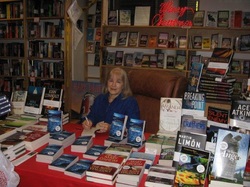by Missye K. Clarke
I’m at my new tripod desk as I work on this month’s longish post, so I please ask your pardon for the inconvenience. Truthfully–and warring winter allergies with pet dander while half-zonked on antihistamines meds–I’m half-winging this, uncertain how to open or grab your attention on a writing topic not done past use, but I suppose this works. I wasn’t about to offer another post of life post-couvid, or kvetch to y’all when do I get my former life back, how I’m adjusting without this or that. Although nothing wrong with those subjects in/of themselves, for one usually a big mouth on issues . . . couvid silenced me another way: The shock of how fast humanity changed past the point of know return, the shock itself, and how this event’s deepoend me despite not wanting to go that crazy depth. Like in almost every writing reference around insisting the main character must adjust to his or her new normal in their worlds, I’ve been forced again to follow suit. Guess my cast is having a good belly laugh at my expense, because in their words: this constant compass-adjusting just fuckin’ sucks. They’re not wrong.
Still . . . I’m notorious for delayed shock, unfortunately exposed to this at an early age. Knocked out cold by a thrown rock when I was nine, I had my first of several out of body experiences, being knocked silly to start with, subsuquent recovery from the OBE, and the shock itself until many weeks later. 9/11/2001, another stunner, now much bigger and deeper with the emergence of a more likely storyline behind that event I’m still unpacking. Still sweaty from kidhood at twenty whem my forty-year-young mom lost her cancer fight; and four years hence, more shock during what should’ve been a joyous time receiving my firstborn the same year my father violently died. As you can imagine, also released that year, Mike + The Mechanics’ “The Living Years” will always hold a certain poignance, the last verse especially useful when I need a good cry to wash my eyes out before allergy meds kick in.
But even couvid and a rigged election’s aftermath still being written before our eyes isn’t my biggest shock, despite the resonance these events still hold. For the longest time, I’ve struggled to put my thoughts and feelings into digestable bites for readers and contributors of this platform to understand, cogitate, and maybe help me change–and on another level, maybe even relate a little to me–without coming off bitchy, arguing too much, or generally be that unlikeable narrator. This subject’s been on my heart since I could remember, only recently instigated by open mockery, hot disdain, and the flat-out exile from groups, orgs., and other socials of daring to hold a dissenting point of view. What was once done in pockets of academia–being a target from both sides while finishing college, you learn a few things–the veneer of impartiality and evenhandedness in the open marketplace of ideas is gone, if it existed to begin with. In its place is a scary, filthy leviathan of a share-our-view-or-else slant now so mainstream you’d have to be living on Pluto most of your life not to see how bad times have become. Don’t misunderstand–this isn’t a political post, nor will such ever be shared here. But I’m speaking–pleading, if I’m being honest–strictly from the standpoint of an author making a modest living on a basic tenet: to speak his or her mind freely no matter how appalling, offensive, or dangerous it may come across. I do not sanction violence. But the right to be as you are, say what you like, how, where, when, or which you like–just being heard, damn it!–is being persecuted in unprecedented ways. I hope to help quelch this, not only in picking up the reins where the fantastic, late, great Nat Hentoff dropped off, but holding to that late Sixties drumbeat I was taught in school: DIFFERENCES ARE GOOD! As I opine this, I’ve tears in my eyes where free speech, free thought, and free expression will go–the helpful, beneficial, positive, uplifting, and inspiring kinds that call on pulling together differences in every one of us we’re the same to and in at the end of the day despite the awful-icky speech we’ve dealt with. Solomon of Proverbs was spot on when he said the tongue is more powerful than the strongest sword or the heftiest ship’s rudder. Hoo-boy, isn’t it ever.
In the guise of “wokeism,” I found myself in #1stAHasAVoice jail from certain platforms within the past year. One was with two scribe orgs. I’m happily no longer assosicated with; Twitter, where I called out several NYT bestselling authors for treating their readers like they’d been asked to enjoy a roten fish smoothie for lunch; and the third was a monthly box I’d gushed over several months back (This last, I owe you a deep apology for–not that you’ll like what I do, but I should’ve vetted this company more thoroughly for my tastes.) I could’ve been a little more diplomatic, suave, evenhanded in my responses. But I suppose holding my feelings and thoughts of what’s moral and just in the name of professionalism was what got even one of us here to begin with is problamatic. Done with being nice, I gave my own exit interviews to those outlets like a wrecking ball discovering demolition sex, having nothing else, in my eyes, to professionally lose. Banned from the blue bird (Sidenote: why are some to most beta males disgusting to strong women they secretly want? What, SWINOs–strong women in name only–need only apply?)–no real loss, since it’s permitting child porn and okaying snitching on your friends/followers/following, euphamistically labeled “Birdwatching” if you haven’t heard, with zero discernment. The tea has it through other socials membership is continuing to decline in my former orgs, including those rethinking their membership in wake of my treatment on principle, and take their wallets where viewpoint alienation isn’t a menu regular. As the quasi-tired expression goes, some are finally seeing the true light in the contrived darkness. I’m happy for this. Being that casuality, or witnessing one, isn’t a picnic, nor is going outside my comfort zone defending the attacked, or letting them stay persecuted (i.e.: capitulation by proxy) hoping in that skein, maybe I won’t be. Un/Fortunately, we’re not in polite times or polite society anymore. Positions will be taken, rooted deeper into, right POV or no. Whichever yours are, hold fast boldly, go all in, bake until done. Lukewarm, wimpy, or milquetoasts anything is unacceptable–in the writing life and your right to speak in it!–and that’s how it is.
As my box-drop is funniest in a you-hadda-be-there kind of way, I’ll expound. Comedians like Seinfeld, Ray Romano, Fred Rubino, identical twins Kevin & Keith Hodge, Larry the Cable Guy, Jeff Foxworthy, Tim Allen, and a slew of others lamented they can’t visit American college and university campuses anymore for stand-up routines. Why? Co-eds are so indoctrinated with unevidenced fear and anger over jokes being offensive to anyone, when it’s that means making dark times more bearable. The kids are right in one sense–even through we ladies might find gallows humor appalling, laughter makes those intense moments less so; I can only imagine the sick jokes during and after Christ’s execution or the rotten timing of satire from some in Titanic’s lifeboats as they waited for the Carpethia. But psychological studies of this phenom back this to be legitimate: dangerous vocations like First Responders or high-rise window cleaners have, or one in a horrific life-changing event, often crack morbid, greusome, or gory jokes to help themselves deal with nightmarish tasks they’d like to forget forever. In the place of some NYPD detectives having to handle recent affairs of child sex trafficking–those terrifying images involved they had to see, they’d damn better joke, joke, joke all the way home. #TooSoon isn’t applicable here.
But an author serving a spoof at couvid’s or its country of origin’s espense? No! Go! Scared me so! Get out, get out, GET!!!! OUT!!!! Not hyperbole, either–it happened all that way. Even this platform came under recent fire for contributors not towing the censorship line others wished they’d do. I defended my fellow authors in both cases that tasteless, crass speech is free to be expressed, as it’s on the reader/listener/viewer to discriminate if they’ll be in audience. Sadly, with many millennials freefalling into the dangers of okaying piecemeal’ed to extreme censorship–and not a few boomers declaring themselves God to push such impositions on–they complained to the CEO and group owners about the emerging author’s share and complained about those who supported her right to express herself. No avail. We were permanantly excused. Just as well–I can’t justify monthly writing tchotchkes on a lean budget, but more imporantly, I won’t patron a business hellbent on quelling voices or views they find objectionable because it challenges their hegemony or stances. Sharing my argument to the CEO that I expected to go unanswered (it did), later that week I received a snarkily-comedic worded exit email, feigning sadness in its “Dear John” seeing me go. Tough sh*t, I’m staying ghost. I won’t give anything of me to anyone, anything, or any cause showing its ass, even more so since my position’s been thoroughly belittled, dismissed, scorned, or openly made fun of. All in the name of tolerance, of course.
Although a tired expression, it’s one worth sharing again: Where He closes a door, He opens a window. Opportunities abound for a warrior. During times of great upheaval, they always, always do.
So. That was my January. The bearded god looking in our past sees . . . what? Wreckage of a broken everything, if we’re being raw honest. The god’s other bearded face looking into our sunrise of what’s to come . . . sees what, exactly? Wreckage illuminated? The glow to rebuild, the light to guide?
The resplendwency to constntly keep in plain sight what never to revisit in history ever again?
That dude’s role sure ain’t what it use-ta be.
Then again, ain’t none of us are.
Stay strong in the fight for the pursuit of life, liberty, and that ever elusive bitch of happiness, my friends and scribe warriors. We’ve only just gotten started.
ps: Almost forgot: Happy Valentines’ Day. May you all be showered in flowers today and always.
.









You must be logged in to post a comment.